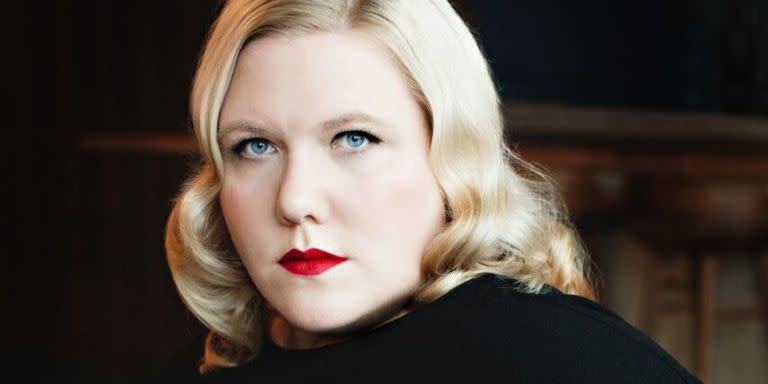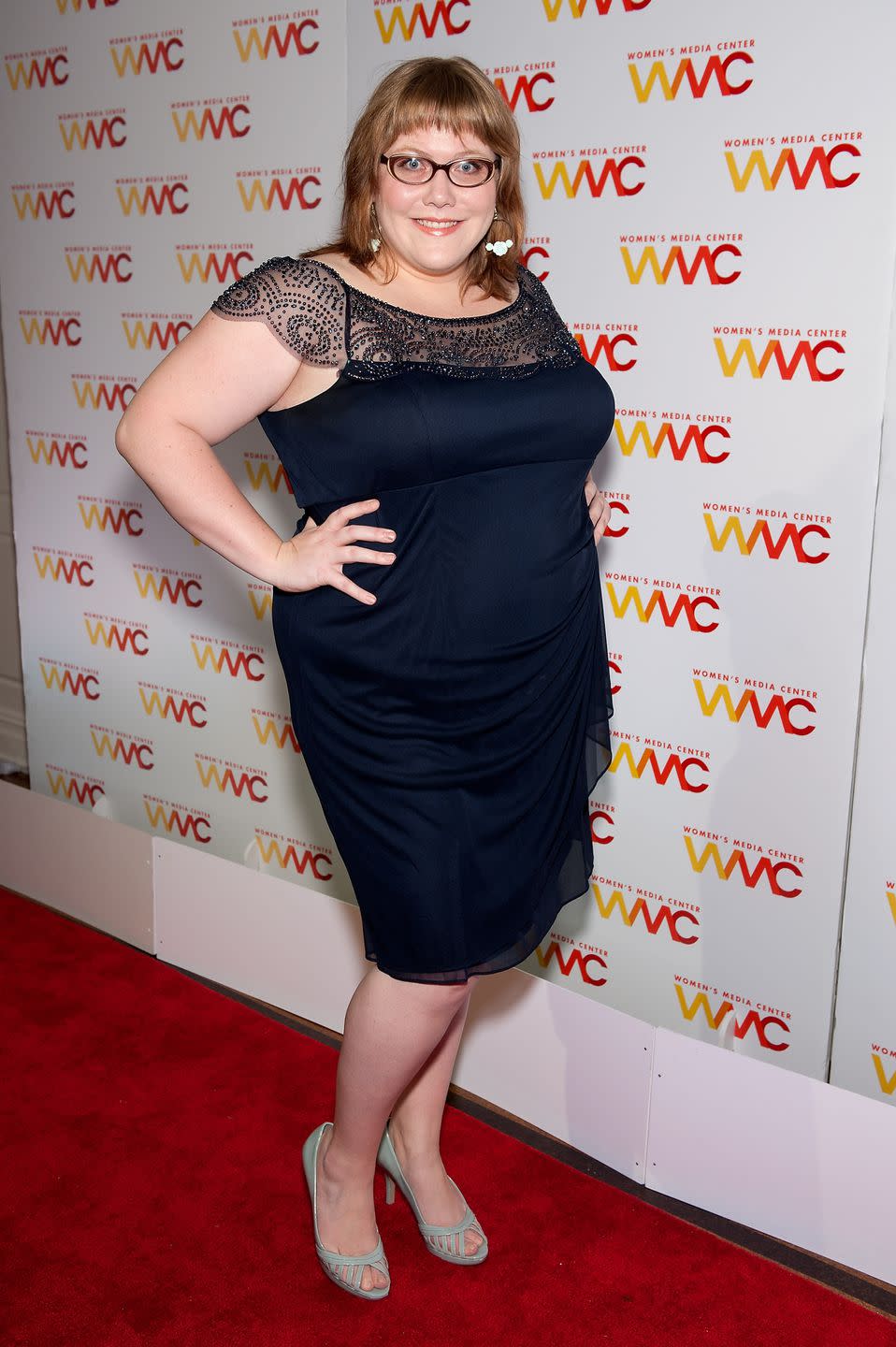Lindy West: The Perfect Body Is a Lie

I remember the exact moment I fell in love with Lindy West: Last year, the feminist writer and culture critic confronted a man on This American Life for impersonating her dead father on Twitter in order to send her insults.
Conventional wisdom says not to feed the trolls. It's what they want; it won't make them stop. For West, who writes about women's rights, body image, and pop culture for publications like Jezebel, GQ, and the New York Times, dealing with Internet abuse is practically part of her job description. Yet when she stood up to this troll, calling him out for his misogyny and lack of basic human empathy, something extraordinary happened.
He apologized.

With the release of her first book, Shrill: Notes from a Loud Woman, West cements her reputation as a woman unafraid to confront (and confound) her critics. The collection of connected essays, spiked with West's signature insight and dark humor, illustrates just how deeply sexism pervades our society while laughing at the absurdities that sexism somehow normalizes. West digs deep into pain—her struggles with body image, her father's death, the harassment she faces online—to find humor and grace.
"What I wanted to do was to humanize myself, because I think feminists are dehumanized a lot, and I think fat people are dehumanized," West explains over the phone. "And I wanted to say, 'Here is a very comprehensive and cohesive human portrait of a fat, feminist woman.' If I can charm people and make them like me, then that has an effect on how people perceive those groups."
"I wanted to provide the role model that I didn't have," she adds.
Now a columnist for The Guardian, West also co-founded the social media campaign #ShoutYourAbortion, which encourages women to speak up about their abortions to remind lawmakers that all kinds of women get abortions for all kinds of reasons. Plus, West runs a Tumblr that answers teens' questions around sex and sexuality, with an emphasis on supporting survivors of sexual violence, called I Believe You/It's Not Your Fault.
West still worked for Seattle's alternative weekly The Stranger when her agent first contacted her about writing a book, but it took about four more years before West realized she wanted to write a series of loosely chronological and "very, very personal" essays.
"At the time, I thought of it as not being able to find the right idea, but really I think in retrospect it was just me needing to find my confidence," West recalls. "There's something really intimidating, and it feels very almost presumptuous, to write a memoir, to say, 'Yes, I think that my life and my opinions are interesting enough to warrant an entire book.' And it took a lot of years of me becoming more experienced as a writer and finding my voice a little bit more before I was ready to do that."
Shrill traces West's evolution from an overweight teen growing up in Seattle, whose best role model for fat womanhood was an animated chicken in Disney's all-animal version of Robin Hood, to a feminist who speaks her mind fearlessly. She also debunks the myth that being overweight dooms a woman to a miserable, unfulfilling, and sexless life. "If an alien—a gaseous orb or a polyamorous cat person or whatever—came to Earth, it wouldn't even be able to tell the difference between me and Angelina Jolie, let alone rank us by hotness," West writes in Shrill. "The 'perfect body' is a lie. I believed in it for a long time, and I let it shape my life, and shrink it." The essays also frequently showcase West's loving relationship with her husband.
"A huge part of the book is coming to terms with the fact…that I have value, because you can't take care of something well if you think that it's worthless," West explains. "So really just the overarching idea that I'm not broken and I'm not garbage was the most powerful, helpful thing… Learning to feel confident and feel okay in my skin is what lets me be bold and confront some of these other issues."
Learning that lesson took years. While writing Shrill, which West says took "eight or nine months" of "sitting alone in a cabin agonizing," West often thought of the confusion and loneliness she felt during her own twenties. Becoming a writer was her solace. Gradually, West realized that even if her opinions were unpopular, they could still be true—and too important to keep to herself.
"You almost get addicted to that process," West says, describing it as "trial and error." "Like, 'Okay, what's the worst that can happen if I say this?' And the worst that can happen is that people yell at you. But…if you're ethically sound in your ideas, and you're careful with what you say, and you listen to people who correct you when you screw up, and you apologize when you screw up, it's a really powerful way to move through the world."

In fact, Shrill focuses primarily on West's experiences speaking up for the unpopular opinion, in what West calls her "culture wars." That is, the struggles against society that have defined her life and career: standing up for the fact that rape jokes often wrongly mock sexual assault survivors, learning to embrace her body, and meeting her troll. The victories were far from easy, but West believes these showdowns only made her stronger.
While West was besieged by rape and death threats online after suggesting that people just might have a right to be offended by rape jokes, her comments also opened many comics' eyes to comedy's ability to perpetuate rape culture. "To feel like I made a positive difference for women in comedy, which I hope that I did, that has huge significance to me," West says. "Every time I hear from a female comic who says that public conversation about rape jokes empowered them in some way—that means everything to me."
Shrill was originally only meant to be the book's working title, but "it just always felt right," West says. Not only is it a sexist term, used nearly exclusively to insult opinionated women—West notes "the way that people talk about Hillary Clinton" as an example—but it's a trait West wants to cultivate.
"I make my tone harsh and strident, and I use language that's considered vulgar, specifically because I know that it turns people off. I want people to face that instinct, and come to terms with the fact that it's a sexist, gross instinct," West says. "It's this dance of charming people and getting people to like me—and then using this kind of unpleasant, ugly language to make the point that women don't have to be pretty. We don't have to be pretty physically. We don't have to be pretty in our words and our ideas. And we can say loud, ugly things and they're legitimate."
Consider Shrill West's battle cry. With every page, she refuses to be shamed for her body and beliefs, or to feel like her story matters less because she happens to be a "fat feminist." Which is lucky for us, because Shrill is only the beginning of West's beautiful literary career.
('You Might Also Like',)

